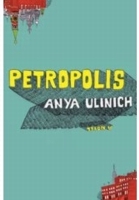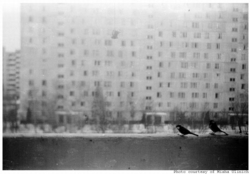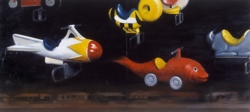 March 07
March 07
Russian as an American Language: A Conversation with Anya Ulinich
David Stromberg
 Anna Sergeievna Ulinich did not necessarily set out to be a writer. She did not necessarily set out to be a Soviet immigrant in America either, but the experience was thrust upon her, and now she has emerged into the public having written a book.
Anna Sergeievna Ulinich did not necessarily set out to be a writer. She did not necessarily set out to be a Soviet immigrant in America either, but the experience was thrust upon her, and now she has emerged into the public having written a book.
Sasha Goldberg, the character at the center of Anya Ulinich's Petropolis, did not set out to be much of anything. She was enrolled by her mother in drawing classes, but only got accepted to the art academy in Moscow through a series of lies that her mother, Lubov Alexandrovna Goldberg, had orchestrated and not exposed even to her daughter. By that point, at the age of fifteen, Sasha had already been attacked perpetually by school kids for her strange looks, abandoned by her father five years before, and just given birth to a daughter, Nadia, of whom Lubov immediately took charge, designating her Sasha's "sister."
Lubov Alexandrovna repeatedly speaks of the intelligentsia – a word that defies class (or tries to work around it). The Goldbergs are part of one of the lowest classes – though not as poor as the father of Sasha's child, eighteen year old Alexey, who lives with his sister and parents in the town dump. Yet within that low class Sasha's mother is the town librarian, and as such tries to maintain some of the "traditions" – or strict social prerequisites – that go with an enlightened life, regardless of its cost.

Neither Sasha Goldberg nor Lubov Goldberg nor even Sasha's father Victor Goldberg (who crowns the trio with their Jewish-affiliated identity) is Jewish. Victor is a half-Russian, half-African love child adopted by Jewish members of the nomenklatura (the privileged upper echelon of Soviet professionals and bureaucrats). So that with his dark skin and afro, both of which he passes on to Sasha, he represents a sort of all-around foreign yet socially embedded element. Lubov (meaning "Love") is the granddaughter of a Wife of the Enemy of the People, sent to Siberia a year after her husband died. She, like Nadia, was taken and raised by her grandmother when her mother proved unfit for the responsibility – in this case not because she was too young, but because she was a complete drunk.
 Lubov does a difficult, but from her point of view necessary, motherly thing: alienating Sasha from her own newborn daughter in the hopes that Sasha will be propelled to make a better life for herself at Moscow's art institute. In fact, Sasha is propelled far beyond Moscow, and through a bridal agency meets and gets engaged to an American man. She moves with him to Arizona using a student visa from a non-existent university in Utah, but it doesn't take her long to abandon her commitment and enter the wilderness of America as an illegal immigrant. Thanks to other Russian Jewish immigrants she meets along the way, she manages to travel to Chicago, becoming a modern indentured servant in the suburbs, and finally escaping to Brooklyn in order to face her father.
Lubov does a difficult, but from her point of view necessary, motherly thing: alienating Sasha from her own newborn daughter in the hopes that Sasha will be propelled to make a better life for herself at Moscow's art institute. In fact, Sasha is propelled far beyond Moscow, and through a bridal agency meets and gets engaged to an American man. She moves with him to Arizona using a student visa from a non-existent university in Utah, but it doesn't take her long to abandon her commitment and enter the wilderness of America as an illegal immigrant. Thanks to other Russian Jewish immigrants she meets along the way, she manages to travel to Chicago, becoming a modern indentured servant in the suburbs, and finally escaping to Brooklyn in order to face her father.
The Very Bottom of American Poverty
Trained as a painter throughout her childhood and young adult life – in Moscow (before leaving the USSR at the age of seventeen), in Chicago (where she attended the Art Institute of Chicago), and at UC-Davis (where she received an MFA in painting) – Ulinich eventually came to mix her earlier visual concerns with ongoing literary ones. These include symbolic image confrontations of old iconoclasts (such as Marx) with new icons (such as Big Bird), reuse of old Soviet negatives, and narrative tendencies with political and personal history as well as the form and function of memory. She explains:
What I like about books versus art is that there's actually a market for books, whereas with art it's a very artificial market. There's an institutional market, and a private gallery one, and maybe a few others, but it's not like in the olden days, when everyone wanted to have their portrait painted. You can't really feed yourself as a painter unless you're a star, and with books it's much different. There are actually people buying these little things that don't cost too much.
 Anya Ulinich is Jewish, and not the daughter of drunks or teenagers. She grew up on the outskirts of Moscow, and though her father told stories of "antisemitic bastards who beat him for being Jewish, the bastards I went to school with weren't with it enough to be antisemitic." Ulinich elaborates:
Anya Ulinich is Jewish, and not the daughter of drunks or teenagers. She grew up on the outskirts of Moscow, and though her father told stories of "antisemitic bastards who beat him for being Jewish, the bastards I went to school with weren't with it enough to be antisemitic." Ulinich elaborates:
They'd never seen a Jew. So yes, I got abused for my ethnic looks, but my derogatory nickname was Armianka (Armenian). But as soon as you have brown hair you're an ethnic minority in those parts, which were full of hard-drinking working-class Russian people. Most girls had a braid down to their butt that was all blond.
In regards to her mother, Ulinich tells the story of how she actually managed to get into the arts academy in Moscow:
I finished high school when I was sixteen, and even though I was the equivalent of a valedictorian – I had this ridiculous little gold medal in a box, which wasn't real gold, of course, and had this little Lenin head on it – and even with straight A's I couldn't get into college, into this very prestigious art school, the Stroganovskaya Industrial Art Institute, which took only a few people per department per year. You have to have your grandpa be a general in the KGB, or you have to pay a lot to 'tutors' who also happened to be on the admissions committee. But my parents were kind of started out late with that, so I wasn't even invited to do the first round test. My mom then bribed a personnel manager and I got a job there as a secretary. Which, at sixteen, I was the world's worst secretary – typing with one finger, missing days at work because I didn't feel like going in. Everyone in the college – every cleaning lady, everyone who worked in the coat-check, all the support staff – we were all hopeful students. Even though I'd hoped to do ceramics, I ended up having to apply for industrial design, which was a joke because we didn't have any computers. We didn't even have enough chairs. But the dean was my boss, and my mom chummed up to her.
The personnel manager was an ex-KGB man who also taught history, and everyone, even the academics, was under his power. So on national holidays, the entire staff would have to march into his office themselves and deliver him a bottle of hard liquor. He'd get really drunk and call all the girls to his office and have these sort of heart-to-heart talks with them, and he was this giant, seventy-year-old toad of a man. But I refused, I was too shy – I said, 'Mom, I just can't go to Oblizyn (which means 'licked-all-over') with this bottle of liquor.' So my poor mom had to take time off work to schlep the bottle of liquor to Oblizyn on national holidays. And after all that I got into college, and was a student there for five days before we left to the US.
 There's both a parallel and radical difference between Soviet Leninist-Marxist education, which ideologically frames one's literal life activity, and American art school education, where Marx and Marxist-leaning writers are taught as vital cultural commentators. But whether or not Ulinich paid attention to her Soviet lessons on Marx or her American art theory courses on Walter Benjamin, the experience of class is something that came most acutely into focus in the United States:
There's both a parallel and radical difference between Soviet Leninist-Marxist education, which ideologically frames one's literal life activity, and American art school education, where Marx and Marxist-leaning writers are taught as vital cultural commentators. But whether or not Ulinich paid attention to her Soviet lessons on Marx or her American art theory courses on Walter Benjamin, the experience of class is something that came most acutely into focus in the United States:
Having been at the very bottom of American poverty, I have a very strong class consciousness. Aside from that, as soon my life becomes easy, I'm like, 'Must add stress.' So I decided to go to grad school and get pregnant at the same time, and showed up there with a six month old baby. I'd take care of her all day, and as soon as my husband came home from work at four in the afternoon, I went to school till two in the morning.
I had this instructor who was a 60's feminist, who just had her kid in her 40's and immediately put the kid into full-time daycare. And she gave me the hardest time, saying, 'Your work is more important. You have to put your kid in daycare. You're not painting enough.'
But I felt like it was pure self-indulgence – was I supposed to put my 'creative self-indulgent expression' before of my baby? I wasn't making any money with painting, and I can't see the situation without it coming through the prism of class. And putting her in daycare to scream her antisocial little head off, while I paint my inner world – it just didn't work for me.
A mother of two, Ulinich is socially aware and concerned, voicing ideals such as daycare for teenage moms, stronger community support in lower class neighborhoods, and healthcare reform:
My father [who lives in Arizona] keeps losing jobs to factories that move across the border to Mexico, and with it goes his healthcare. But it's to the point now where the turnover is so high that he tells my mom not to use the insurance at the doctor, and to just pay cash, because if he loses his job the insurance at his next job will know about the preexisting conditions. And so many people go without coverage all together. You go to the emergency rooms and see people with the flu, or with strep throat, because they don't have a doctor, and this is the only way they can get medical attention and prescriptions.










